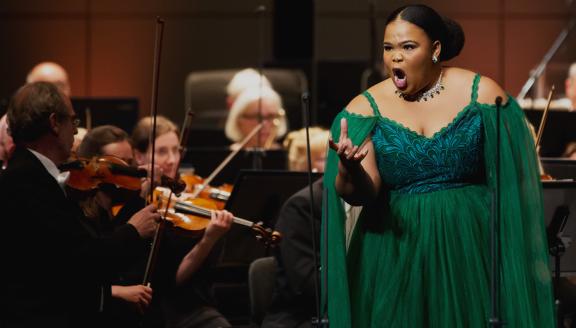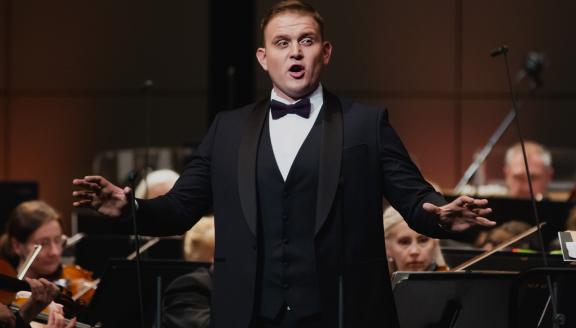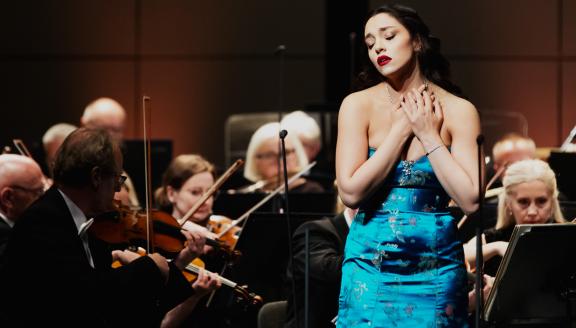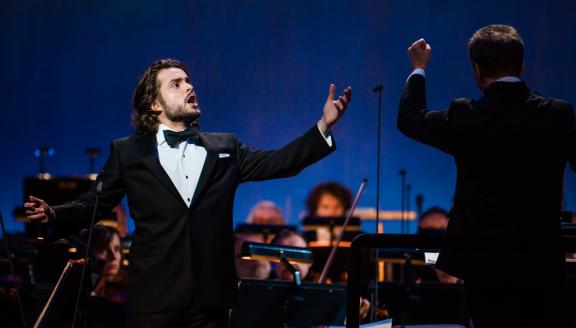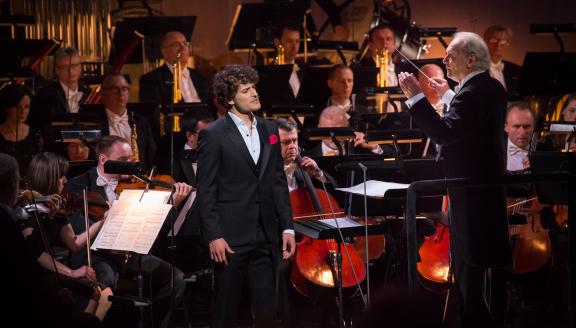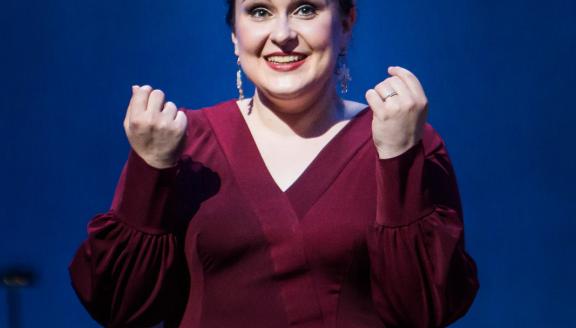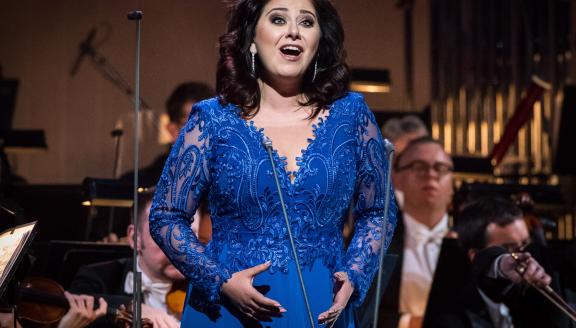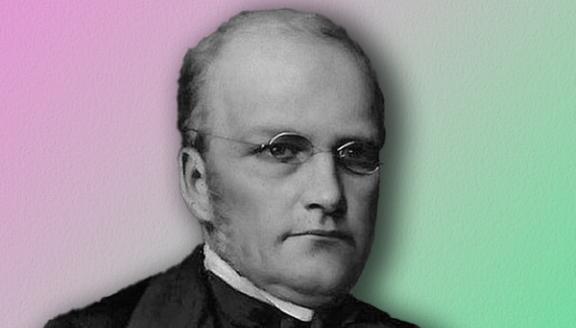
Organised by Polish National Opera, the International Stanisław Moniuszko Vocal Competition is the biggest singing competition in Poland. Every three years, young artists from around the world gather in Warsaw to present their talents and, for many of them, the Competition is a launch pad for an international career.
Established in 1992 by Maria Fołtyn, Polish soprano opera director and promoter of Stanisław Moniuszko’s oeuvre, the Competition celebrates its twelfth edition in 2025. The list of past prize winners and finalists includes such excellent artists as Aleksandra Kurzak, Mariusz Kwiecień, Małgorzata Walewska, Olga Busuioc, Salome Jicia, Andrzej Filończyk, Krzysztof Bączyk, Joanna Zawartko, Ewa Tracz, Long Long, Gihoon Kim, Maria Motolygina, Gabriela Legun, Nombulelo Yende, Juliana Grigoryan and Jakub Józef Orliński. The Competition Jury is made up of managers from top international opera houses alongside respected artists and singers. From its very beginning, this event has been more than just about artistic competition at the highest level. The Moniuszko promotes Polish repertoire to an international audience. Each singer performs at least one Polish opera, oratorio or operetta aria in the Finals - not only by the Competition’s patron Stanisław Moniuszko, the father of the Polish opera, but others such as Fryderyk Chopin, Mieczysław Karłowicz, Karol Szymanowski, Ignacy Jan Paderewski, and contemporary Polish composers such as Krzysztof Penderecki, Paweł Mykietyn and Paweł Łukaszewski.
AWARDS
First Prize – Samuel Stopford
Second Prize – Arpi Sinanyan
Third Prize – Aksel Daveyan
Fourth Prize – Mariana Poltorak
Special prizes
Maria Fołtyn Prize for the best performance of a Stanisław Moniuszko piece – Samuel Stopford
Ewa Podleś Prize for the outstanding musical personality (funded by ORLEN, the Patron of the Competition) – Mariana Poltorak
Prize for the most beautiful performance of a Polish song (funded by ORLEN, the Patron of the Competition) – Aksel Daveyan
Audience Prize (funded by the Teatr Wielki - Polish National Opera) – Aksel Daveyan
CAST
|
Finalists
|
Roman Chabaranok
Aksel Daveyan
Justyna Khil
Zhe Liu
Laura Lolita Perešivana
Mariana Poltorak
Viktoriia Shamanska
Arpi Sinanyan
Samuel Stopford
Mariam Suleiman
Zixin Tang
Yuer Ye
|
|---|---|
|
Presenter
|
Aleksander Laskowski
|
|
Pianist
|
Martín García García
|
|
Orchestra
|
Polish National Opera Orchestra
|
| ... | |
|
Conductor
|
José Maria Florêncio
|
|---|---|
| ... | |
VIDEOS
Finalists












Programme
Yuer Ye, soprano, China
Suknio, coś mnie tak ubrała - The Countess, Moniuszko
Roman Chabaranok, bass, Ukraine
Che mai vegg’io… Infelice! E tu credevi… - Ernani, Verdi
Aksel Daveyan, baritone, Armenia
Largo al factotum - Il barbiere di Siviglia, Rossini
Justyna Khil, soprano, Poland
Roxana's Song - Król Roger, Szymanowski
Zhe Liu, baritone, China
Vision fugitive - Hérodiade, Massenet
Laura Lolita Perešivana, soprano, Latvia
Ha! Dzieciątko nam umiera… O mój maleńki - Halka, Moniuszko
Mariana Poltorak, soprano, Ukraine
Dich, teure Halle - Tannhäuser, Wagner
Viktoriia Shamanska, soprano, Ukraine
Roxana's Song - Król Roger, Szymanowski
Arpi Sinanyan, soprano, Armenia
Ha! Dzieciątko nam umiera… O mój maleńki - Halka, Moniuszko
Samuel Stopford, tenor, UK
Tombe degli avi miei...Fra poco a me ricovero... - Lucia di Lammermoor, Donizetti
Mariam Suleiman, soprano, Italy
Roxana's Song - Król Roger, Szymanowski
Zixin Tang, mezzo-soprano, China
Amour ! viens aider ma faiblesse! - Samson et Dalila, Camille Saint-Saëns
Yuer Ye, soprano, China
Song to the moon - Rusalka, Dvořák
Roman Chabaranok, bass, Ukraine
O mościwi mi panowie - Halka, Moniuszko
Aksel Daveyan, baritone, Armenia
I ty mu wierzysz, biedna dziewczyno - Halka, Moniuszko
Justyna Khil, soprano, Poland
Do not utter a word - Vanessa, Samuel Barber
Zhe Liu, baritone, China
Skąd tu przybyła - Halka, Moniuszko
Laura Lolita Perešivana, soprano, Latvia
Bel raggio lusinghier - Semiramide, Rossini
Mariana Poltorak, soprano, Ukraine
Ha! Dzieciątko nam umiera… O mój maleńki - Halka, Moniuszko
Viktoriia Shamanska, soprano, Ukraine
Amenaide's aria Come dolce all’alma mia - Tancredi, Rossini
Arpi Sinanyan, soprano, Armenia
Ben io t’invenni… Anch’io dischiuso un giorno… Salgo già del trono aurato - Nabucco, Verdi
Samuel Stopford, tenor, UK
Cisza dokoła - The Haunted Manor, Moniuszko
Mariam Suleiman, soprano, Italy
Caro nome - Rigoletto, Verdi
Zixin Tang, mezzo-soprano, China
Biegnie słuchać w lasy, w knieje - The Hauted Manor, Moniuszko
Piano recital by Martín García García
Franz Schubert Moments musicaux D. 780 No. 1, 2, 3
Stanisław Moniuszko Wilanella B-flat major
Mieczysław Karłowicz Przed nocą wieczną arr. Martín García García
Federico Mompou Canción y Danza No. 4
Mieczysław Karłowicz Pamiętam ciche, jasne, złote dnie (arr. Martín García García)
Karol Szymanowski Dziewięć preludiów Op. 1 No. 9 and Op. 1 No. 1
Federico Mompou Canción y Danza No. 1
Fryderyk Chopin Impromptu F-sharp major Op. 36 No. 2
Stanisław Moniuszko Prząśniczka (arr. Henryk Melcer-Szczawiński)
Federico Mompou Canción y Danza No. 5 and No. 6
Karol Szymanowski Four etudes Op. 4 No. 3 b-moll
Federico Mompou Jeunes Filles au Jardin from Scènes d’Enfants
Karol Szymanowski Nine Preludes Op. 1 No. 8
Fryderyk Chopin Impromptu Ges-dur Op. 51 No. 3
Isaac Albéniz Lavapiés from Iberia Book 3, No. 3
Jury
John Allison
Chair of the Jury. Editor of ‘Opera with Opera News’
Brian Dickie
Artistic Adviser and Consultant, Garsington Opera and English National Opera
Tobias Oliver Hasan
Coordinating Opera Director, Staatsoper Unter den Linden, Berlin
Paul Hopper
Senior Director of Artistic Planning and Head of the Domingo-Colburn-Stein Young Artist Program, Los Angeles Opera
Rosemary Joshua
Soprano, Head of the Dutch National Opera Studio
Peter Mario Katona
Director of Casting, Royal Opera House Covent Garden
Izabella Kłosińska
Director of Casting, Teatr Wielki - Opera Narodowa
Mariusz Kwiecień
Baritone
Thomas Lausmann
Director of Music Administration, Metropolitan Opera
Dominik Licht
Director of Casting and Planning, Salzburg Easter Festival. Casting Consultant, Royal Danish Opera
Olga Pasichnyk
Soprano
Karen Stone
Executive Director, Opera Europa
Tobias Truniger
Director of the Opera Studio, Bayerische Staatsoper
Edith Wiens
Soprano and Vocal teacher. Director, Internationale Meistersinger Akademie
Evamaria Wieser
Casting Director, Salzburg Festival. European Casting Consultant, Lyric Opera of Chicago
Insights
The father of Polish opera
Stanisław Moniuszko (1819–1872) was a Polish composer widely regarded today as the creator of Polish national opera.
He was born in 1819 in Ubiel in present-day Belarus. He began learning music with his mother as a teacher. When the family moved to Minsk, he studied with Dominik Dziewanowski, then trained with August Freyer in Warsaw. Just before the November Uprising (1830), the family went back to Ubiel. In 1836 Moniuszko left again for Berlin to study music with Carl Rungenhagen, the head of the city’s Singakademie.
Having completed his studies in 1840, Moniuszko retuned to Poland. He married Aleksandra Müllerówna, whom he had met a few years back, and settled in Vilnius, earning a living as organist at Saint John’s church. Simultaniously, he was involved in artistic projects meant to animate the city’s music life. He organised performances of his operas and operettas in private salons. In 1847, under the influence of Włodzimierz Wolski, a man of letters from Warsaw, Moniuszko wrote the two-act opera Halka, which was performed in a concert version in Vilnius, yet enjoyed merely local success. However, the composer’s contacts with Warsaw’s bourgeoisie and aristocracy, e.g. Józef Sikorski, editor-in-chief of the music magazine ‘Ruch Muzyczny’, and General Ignacy Abramowicz, director of the state theatre administration, were to bring a significant shift in Moniuszko’s life and career.
The turning point came in 1858, when a new, four-act, version of Halka was given its debut. Soon afterwards, General Abramowicz appointed Moniuszko Conductor of Polish Operas at Warsaw’s Teatr Wielki. From that moment on, Moniuszko would present a new opera each subsequent year. His Flis (The Raftsman) was given a debut at the end of 1858, Hrabina (The Countess) premiered in 1860, and Verbum Nobile opened in 1861. As tensions were growing in Warsaw on the onset of the January Uprising (1863), the premiere of Moniuszko’s The Haunted Manor was delayed. Considered Moniuszko greatest achievement along with Halka, it was given a debut only in 1865. Before he died, Moniuszko had managed to complete Paria and Beata, leaving a few other works unfinished.
Having settled in Warsaw, Moniuszko took up a post at the newly-opened Institute of Music, teaching harmony and counterpoint. Moniuszko’s large family (Stanisław and Aleksandra had ten children) lived close to the Teatr Wielki: today you can see plaques commemorating the composer on the walls of buildings on Mazowiecka Street and in the Old Town. Stanisław Moniuszko went down in history as ‘the father of Polish opera’ and a leading Polish composer of art songs. He compiled a collection of over two hundred songs called Śpiewnik domowy (Songbook for Home Use), which is a valuable counterpoint to the Romantic legacy of Franz Schubert and Robert Schumann. The most popular song in the collection is Prząśniczka.
Stanisław Moniuszko died of heart failure on 4 June 1872 in Warsaw and was buried in the Powązki Cemetery. A museum devoted to him was established in Ubiel in the 1980s. Most of his works are held at the Library of the Warsaw Music Society, which Moniuszko co-founded.
Widely recognised as an opera and art song composer, Moniuszko also wrote chamber, ballet, piano, and organ music.




